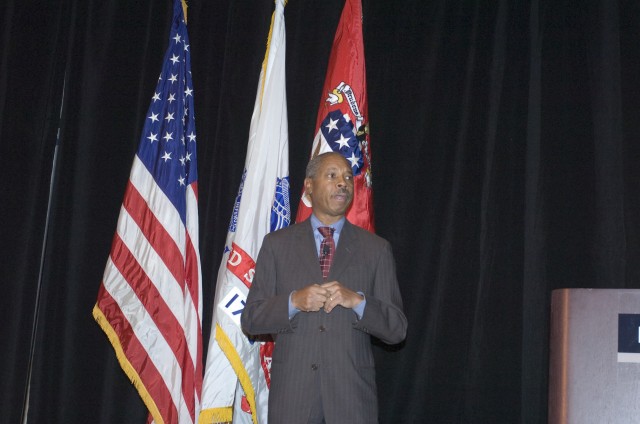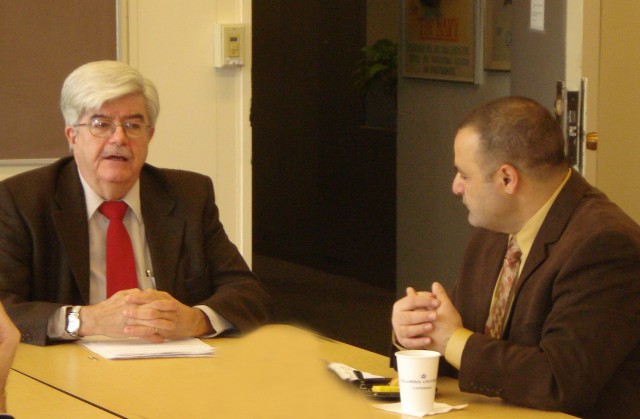"This is the right way to learn. You should be on the ground talking, learning and sharing ideas and information with the people who are doing the work," said Robert Johnson, Bronx County District Attorney.
Johnson was one of the guest speakers who shared lessons learned and ideas with Army War College students during the academic field trip to New York City Nov. 19-22. The experience provides the entire student body with real-world applications of the lessons of the National Security Policy and Strategy course.
"The NYC Trip offers students the opportunity to tie together three key courses of the core curriculum, Strategic Thinking, Strategic Leadership, and National Security Policy and Strategy," said Dr. Bill Johnsen, USAWC Dean of Academics. "Small group visits to important public and private sector businesses and think tanks, municipal, county, state, and federal agencies, the United Nations, and the UN missions of our International Fellows offers students and faculty the opportunity to see in practice the theory and concepts that they have discussed in the seminar room for the past three-plus months."
"This is a unique learning experience to be able to see firsthand many of the things we learned in seminar," said student Lt. Col. Tyler Harder. "We discussed the application of strategic leadership skills, weighed the impact of national policies on local governments, explored the challenges facing our cities, and considered the problems confronting major corporations in today's complex international security environment. We have seen the interplay of the financial, economic, informational, and law enforcement elements of power at work."
"It gave my seminar an excellent example of intergovernmental workings and relationships outside of DoD," said student Lt. Col. Irene Glaeser. "We learned firsthand about how agencies depend upon one another to accomplish their broader objectives."
"We learned about how they respond to challenges, for example, the different communication methods that the various agencies responding to 9/11 employed, and how they addressed them for future incidence," she said. "The applications of New York City and its successes and sometimes failures can be applied to military strategy as well."
During the four-day trip, students visited organizations that have key roles in the public and private sector. Some of the organizations visited during this year's trip were the American Red Cross, Federal Emergency Management Agency, New York City Police, Department of Homeland Security and Customs and the U.S. Mission to the United Nations.
Ten students visited the Columbia University Institute of War and Peace where the students discussed international issues with the faculty.
"Our visit to Columbia enabled us the opportunity to discourse with first-rate academics who are studying the same issues we are," said student Col. Brian Butcher.
One was Richard Betts, the Arnold A. Saltzman Professor of War and Peace Studies at Columbia University.
"You need to be able to look at issues from both the short and long term angles," Betts said. "Many times the faults in policy can be traced back to a short-sighted view of the world."
Betts has also served on the staff of the U.S. Senate Select Committee on Intelligence and as a consultant to the National Security Council and Central Intelligence Agency.
Betts shared his thoughts on current events and national security policy.
"We need to make sure we're looking past the current problems of terrorism, because that's never going to go away," he said. "What we need to worry about is what hasn't happened yet." He and the students discussed the situations in Iraq, Afghanistan and North Korea and how they may shape policy for the foreseeable future.
"If anyone has a quick solution for any of these, it's Nobel Prize-worthy," he joked.
The professors provided three pragmatic, focused discussions on the multitude of challenges confronting the new administration," said student Lt. Col. Scott Sharp. "The perspective and research provided by the Institute of War and Peace gave context to National Security issues at the core of the National Security Policy and Strategy Course."
Other students visited the New York Police Department and saw how they operate and how they face similar challenges to the military.
"They really took the time to demonstrate to us the massive amount of recruiting and training that goes into their being one of the premier police departments in the world. They struggle with many of the same challenges as the military," said Glaeser.
On day two, the topic of discussion was the United Nations. A panel made up of Amb. Roseanne DiCarlo, U.S. Alternative Representative for Special Political Affairs to the United Nations, Netherlands Col. Willem van Dullemen, Chief Current Military Operations Service to the United Nations, Ambassador Abdullah Hussain Haroon, Permanent Representative of Pakistan to the United Nations, stimulated thought and discussion.
"Today we have robust support in the UN for a United Nations' role in Iraq," said DiCarlo. "We also have a responsibility to protect Darfur. We have to come in and help. We need to refocus the UN on human rights. "
Van Dullemen discussed the structure and role of the Military Affairs Department of Peacekeeping Operations.
"Integrated cooperation between the members is key to the success of any mission," he said. "We need to be able to execute multi-dimensional peacekeeping. Many times these missions are launched before the conflicts end and we need to be able to both protect those we're trying to help and the forces trying to keep the peace as well."
The UN is involved in 19 peacekeeping missions, with more than 113,000 troops from 119 countries deployed.
"We are facing an increasing demand and need all member nations to participate."
Haroon talked about the situations in Afghanistan and Pakistan and the history of the United States - Pakistan relationship.
The morning of day three focused on domestic issues and included talks by Robert Johnson, Bronx County District Attorney and Brad Billet, New York City Deputy Commissioner. Billet directs and advises on matters of security and emergency management related to the international community. He coordinates with all law enforcement and emergency service agencies in preparation for high-security events, such as the United Nations General Assembly Debates and UN Special Sessions.
Billet focused his talk on the role the international community plays in New York City.
"More than 40 percent of the New York City population is born outside of the United States," he said. "Diplomatic issues in the world have effects that at times reach all the way to our city and vice-versa. That's why relationship building is an important part of what we do. Public safety, especially when terrorism is a chief concern," he said. Billet pointed out the possible dangers and issues that arise while recounting the 9-11 attacks and 1993 bombing of the World Trade Center.
"You're never totally prepared for an incident of that magnitude," he said. "That's why emergency planning at every level is so important."
Johnson focused on local issues and how they fit into the bigger picture of safety and security.
"I'm a large believer that prevention is wiser than prosecution," he said. "That's why the youth and community programs are so important. The younger and more often you can get to people and stress their role and responsibility the better."
At the conclusion of his talk, the students boarded the buses for their trek back to Carlisle, armed with fresh perspectives.
"We had the opportunity to meet with some of the most senior executives and practitioners in business and government who are resident in the world's most vibrant city," said Harder.
"It was an extremely useful trip and an opportunity to better understand the complexities of the contemporary urban environment and to gain a better understanding of the United Nations and its operations," said Butcher.




Social Sharing